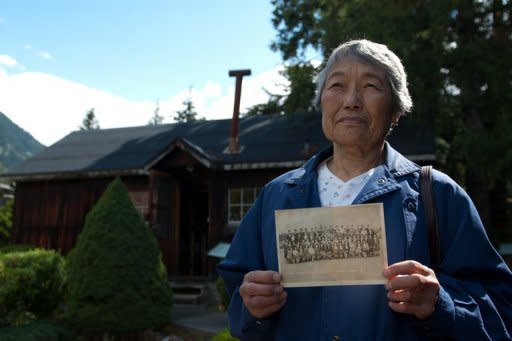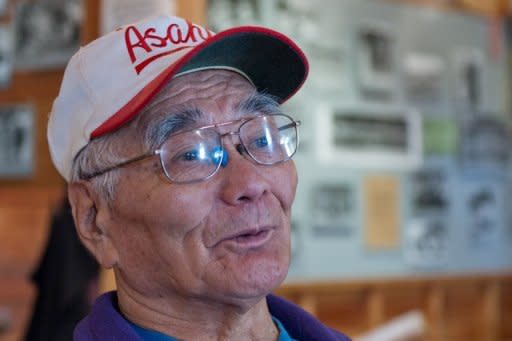Japanese return to Canada's WWII internment camps
Seven decades after the bombing of Pearl Harbor, Japanese are returning to the camps in Canada where they were interned during World War II. The December 7, 1941 attack on the main US naval base in the Pacific plunged the United States into war but also changed the fate of tens of thousands of Japanese immigrants to Canada and their children. Accused of being a "fifth column," they were stripped of civil rights and sent to internment camps in the Rocky Mountains of British Columbia or to forced labor camps in Alberta, Manitoba and Ontario provinces. Hidden in a conifer forest nestled amongst snow-capped mountains, rows of log cabins form the village of New Denver. An elderly Japanese man accompanies tourists to the former internment camp. Nobby Hayashi, 83, recalls staying here for three years, along with 1,500 other interned Japanese. "In every shack there were two families, one in each room," said Hayashi. "It was spacious compared to the tents we had in the winter of 1942... When we arrived there was nothing here, just an orchard." The accommodations were basic: no insulation, only bunk beds, a table with a few chairs in each, and a wood-burning stove for heat and cooking. "My father had been in the hospital (in Vancouver) prior to the attack on Pearl Harbor. And every day when my mother came to see him, he would tell her that he was really happy that the doctor and the nurses were so good to him," said Irene Tsuyuki, a former detainee at another camp in the Rockies. "But December 7, my mother went to see him, and he was very, very upset. Suddenly, nobody was talking to him, and he didn't understand why." Japan's bombing of Pearl Harbor had stirred a strong anti-Japanese sentiment in this country, as in the United States. Canadians pressed Ottawa to neutralize the "fifth column" by ordering the detention of persons of Japanese descent in the country. On February 24, 1942, the Japanese were declared a threat to national security. "The Canadian government thought the Japanese were spies," recalls Emiko, who was sent with her family to a camp in neighboring Alberta province. Some 22,000 Japanese-Canadians were interned in the camps. Their properties were seized and sold off by the state to help pay for their internment. A tourist asks Hayashi why they never tried to escape. He pauses. "It's not in the Japanese mentality to disobey orders, (and) we were all registered." Besides, he adds, "To go where? We were surrounded by mountains." When the war ended, Ottawa offered its wards two options: remain in Canada but east of the Rockies, far from the Pacific Coast and links to Japan, or return to Japan. For some immigrants the choice of returning to their birth country was complicated by the fact that their children were born in Canada. Some 4,000 of them, including the Tsuyuki family, took what many still bitterly describe as a paltry sum of money offered by the government as compensation for what was taken from them, and booked travel back to Japan, on its knees after atomic bombings. Irene Tsuyuki waited four years before coming back to Canada and another 40 years for Ottawa to apologize for the internment of Japanese. On September 22, 1988, the Canadian government recognized it had wronged them. At the end of the visit to New Denver, Hayashi is asked what she feels coming here now. He replies: "For me, the only way I can forget about it is to let it all out, and tell the story."



